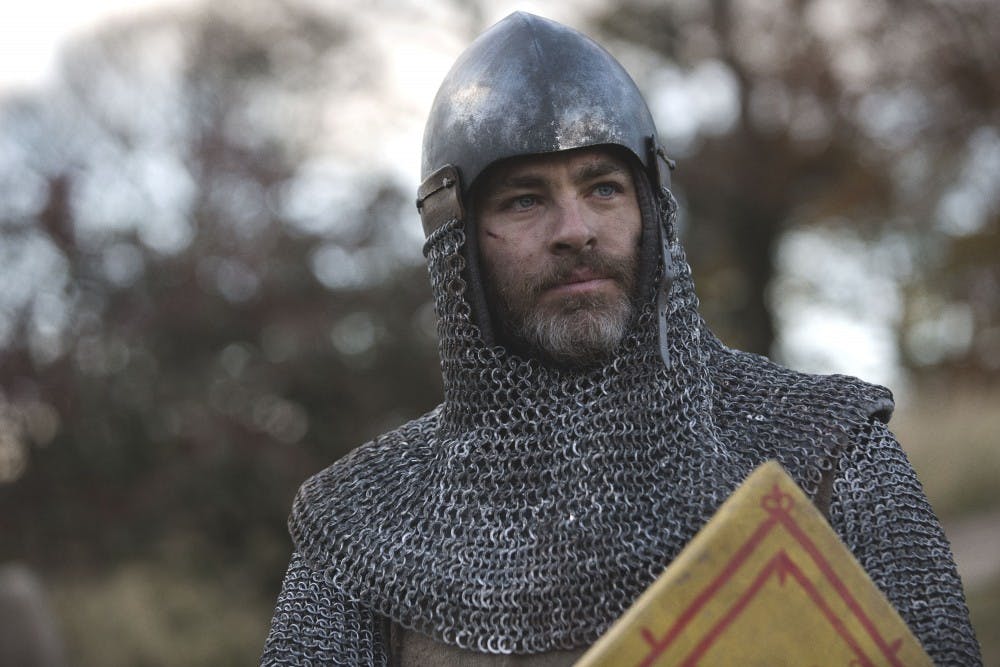Outlaw King has the near–impossible task of depicting an exalted figure in medieval history and his victory. This legend is Robert the Bruce, or Robert I of Scotland, the man who led his country into independence from beneath English rule in the year 1306. He is a fabled warrior, a proclaimed hero, and someone almost larger than life. He defeated England when they were outnumbered by at least 5,000 men with genius military tactics, encouraged his soldiers in a time where it seemed hopeless, and built his army from the ground up. Outlaw King then has a heavy task in presenting him, but, surprisingly, it succeeds.
The task of portraying Robert the Bruce falls on the endlessly talented Chris Pine. The ensemble, though often lost in the fray of men in matted hair and on horses, is skilled too. Aaron Taylor Johnson is a perfectly deranged Douglas, a man who fights for what he believes in with spit foaming at the mouth. In comparison to him is the merciless Prince of Wales, later to become King Edward II (Billy Howle), Bruce’s main enemy in this battle of Scotland and England. However, Pine is the pulse of the film, along with his perfectly–coiffed wife Elizabeth de Burgh (Florence Pugh). Their relationship is a central aspect of the plot, in balance with the stories of war and politics, and it is here that the film succeeds.
As a whole, Outlaw King is technically beautiful. The filming of the first scene is a single long shot, carrying throughout a duel which involves masterful fight choreography that is both graceful and realistic. There is something very casual in the way Robert the Bruce (before becoming outlaw and king) and the Prince of Wales face off in the center of a muddy field surrounded by tents and life going on without them, though a loose circle forms as an audience to the fight. The accents are unnoticeable in their acceptability, but most important is the consistency of Pine’s Scottish accent, which holds up throughout. The dialogue is not afraid to be anachronistic; it clarifies this quickly with the King of England (Stephen Dillane) informing Douglas that he “has balls.” It walks a fine line between being outwardly and obnoxiously modern or too old–timey. This actually works, especially with the source material being placed so far in the past; being genuine in the text would be impossible for an audience to decipher.
For its negatives, Outlaw King leaves much unsaid, symbolism and context clues left to guide us through the plot. Occasionally this works in obvious scenes, such as the marriage between Robert and Elizabeth, or the moment of Robert’s father’s death, but other political moments get lost. Clarification should not be necessary every step of the way, but the beauty and vagueness of the film come at the cost of audience understanding. This is likely the greatest flaw of the film, despite all its positives.
However, the balance of the film is carefully kept. For example, there is an extended sex scene that is immediately followed by a bloody and unfair battle, depicting the constant battle between intimacy and the terror of war. The more horrific elements of this era (the senseless violence, grotesque bloodiness, and chaos) are done impressively, in direct contrast to the polished duels of the wealthy. In fact, it is the tug and pull between the softness of humanity and the harshness of the time that is the crux of the storytelling. The best moments are at this intersection: the political tensions as Bruce’s brother, Neil, gets dragged away to be executed, while Bruce’s daughter cries, “Uncle Neil!” as he’s pulled off (in response he is cruelly murdered in front of everyone). And, for once, the heroes—Robert the Bruce, Douglas, and Angus, a stedfast ally—are allowed to cry at their own victory, at their own losses, their brothers killed and their enemies slain. Such fragility in the glorious hero of Scotland is Outlaw King’s strongest point, a masculinity that is neither overemphasized or entirely downplayed. Often, it is not so, especially with the idea of the proud Scottish warriors. This is what I expected going in: excessive gore for the sake of action, violent masculinity, and no remorse on anyone’s part. However, this is far from the case with Outlaw King, a delicate piece which realizes the legacy of the King and, in some moments, defies it. Robert the Bruce is, indeed, the stuff of legend, but he is also a human being, a husband, and a father. This is the beauty of the film and what others could learn from: the legends of the past are not faultless heroes, but complex people with layers of humanity.







